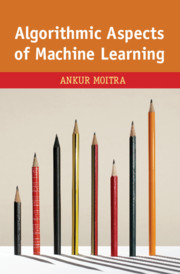Description
Algorithmic Aspects of Machine Learning
Author: Moitra Ankur
Introduces cutting-edge research on machine learning theory and practice, providing an accessible, modern algorithmic toolkit.
Language: English
Subject for Algorithmic Aspects of Machine Learning:
Approximative price 36.76 €
In Print (Delivery period: 14 days).
Add to cart
Algorithmic Aspects of Machine Learning
Publication date: 09-2018
158 p. · 15.2x22.8 cm · Paperback
Publication date: 09-2018
158 p. · 15.2x22.8 cm · Paperback
Approximative price 86.50 €
In Print (Delivery period: 14 days).
Add to cart
Algorithmic Aspects of Machine Learning
Publication date: 09-2018
158 p. · 15.7x23.7 cm · Hardback
Publication date: 09-2018
158 p. · 15.7x23.7 cm · Hardback
Description
/li>Contents
/li>Biography
/li>
This book bridges theoretical computer science and machine learning by exploring what the two sides can teach each other. It emphasizes the need for flexible, tractable models that better capture not what makes machine learning hard, but what makes it easy. Theoretical computer scientists will be introduced to important models in machine learning and to the main questions within the field. Machine learning researchers will be introduced to cutting-edge research in an accessible format, and gain familiarity with a modern, algorithmic toolkit, including the method of moments, tensor decompositions and convex programming relaxations. The treatment beyond worst-case analysis is to build a rigorous understanding about the approaches used in practice and to facilitate the discovery of exciting, new ways to solve important long-standing problems.
1. Introduction; 2. Nonnegative matrix factorization; 3. Tensor decompositions – algorithms; 4. Tensor decompositions – applications; 5. Sparse recovery; 6. Sparse coding; 7. Gaussian mixture models; 8. Matrix completion.
Ankur Moitra is the Rockwell International Associate Professor of Mathematics at Massachusetts Institute of Technology. He is a principal investigator in the Computer Science and Artificial Intelligence Lab (CSAIL), a core member of the Theory of Computation Group, Machine Learning@MIT, and the Center for Statistics. The aim of his work is to bridge the gap between theoretical computer science and machine learning by developing algorithms with provable guarantees and foundations for reasoning about their behavior. He is a recipient of a Packard Fellowship, a Sloan Fellowship, an National Science Foundation (NSF) CAREER Award, an NSF Computing and Innovation Fellowship and a Hertz Fellowship.
© 2024 LAVOISIER S.A.S.
These books may interest you

Mathematics for Machine Learning 49.66 €

Mathematics for Machine Learning 96.92 €


